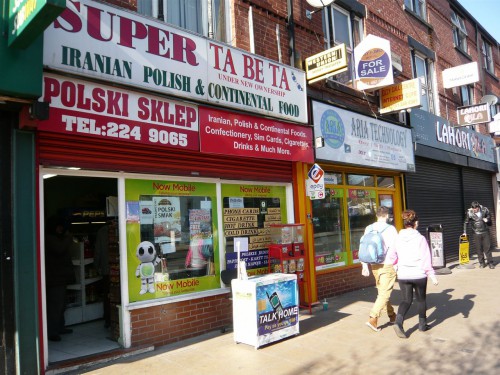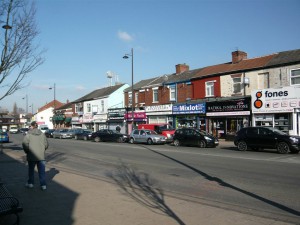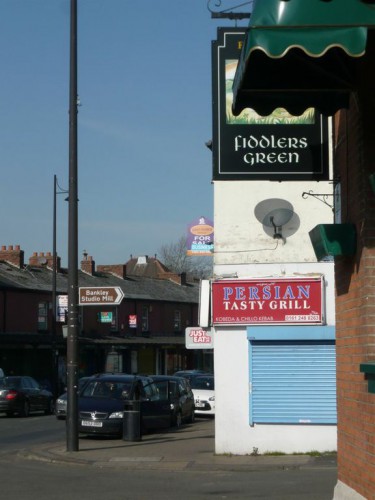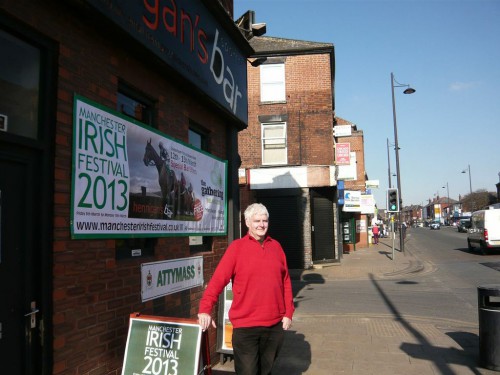The first cupcake shop on Stockport Road
Article published: Thursday, February 28th 2013
In the first of our series on how migrants have shaped Manchester, Kathrin Ohlmann reports on the changing face of Levenshulme high street.
 A small market is squeezed into the car park behind Stockport Road on the corner of Hennigan’s sports bar. Colourful marquees hold a cupcake stall, local independent café and bakery, Indian food, handmade cards, soaps and paintings.
A small market is squeezed into the car park behind Stockport Road on the corner of Hennigan’s sports bar. Colourful marquees hold a cupcake stall, local independent café and bakery, Indian food, handmade cards, soaps and paintings.
The market is part of an initiative to save Levy high street – as the locals affectionately call it. Levenshulme didn’t win the bid to get the help of retail “guru” Mary Portas – a disappointment to Lawrence Hennigan, the man behind the market and chair of the Levenshulme Traders’ Association. “I’m 100 per cent sure that the market will help to save the high street, and it’s our only way of getting businesses and maybe shops here outside of the city centre.”
Hennigan is passionate about Levenshulme where he was born to Irish parents in 1956. Back then it was more than 50 per cent Irish. “You still know what it’s like when you go to St. Mary’s Church on a Saturday evening or Sunday morning,” says Hennigan. He adds that although most Irish and Irish descendants have moved out, they still come back to socialise.
Irish heritage
The percentage of Irish in Levenshulme today is only about 7 per cent of the total population but the heritage is still seen: there are five Irish-run pubs on Stockport Road and during the annual Irish festival more than 200 events take place in the area. The Irish president visited Levenshulme for the County Mayo festival in November. Hennigan helped to organise the festival and has been involved with Manchester Irish festival for years. He owns three of the pubs and a property development company.
Apart from Irish pubs, Stockport Road is lined with takeaways, charity and pound shops, off-licences, and bookies, while about a quarter of the shops are empty. This is very much an eyesore for Hennigan, but not everyone sees it that way. “This is a deprived area, and people are poor,” says Behrouz Afshar, owner of one of the Polish shops on Stockport Road. He says that the locals couldn’t afford to spend money on cupcakes. “People are spending money on cigarettes, bookies, gambling – minimal on food.” His shop Super Ta Be Ta sells Polish and Middle Eastern food but their main income is from cigarettes. “If I didn’t sell cigarettes, I’d have to close down.”
The business rates for his shop are subsidised because the council doesn’t want any more empty shop units. The recession is felt as people have got less and less money, so for Afshar, “They’re 1p, 5p, or 20p short for things they buy.”
“Love Levenshulme”
He joined his business partner at the shop last year when he graduated with a BA in accountancy from Salford University. He lives in Prestwich and came to Manchester from Iran in 1982. “The Iranian community is spread out all over the place: Prestwich, Gorton, Stockport, and a few live in Levenshulme.”
He adds that Iranians came into the area six or seven years ago. “They come to the shops so they don’t have to go into town, and we’re close to Longsight.” Their customers are Iranian, Polish, Ukrainian, Slovakian, and English.
Afshar went to have a look at the new market. “No one was there when I went down. Do the people actually buy anything? I don’t think they spend any money.” He is not sure if the initiative would be the right way to help the area, “Why should Levenshulme be special? What does it need crafts for?”
Over the past few years, Levenshulme has become more attractive to first-time buyers due to the cheap house prices. This brings more middle-class young families, couples and professionals to the area. Some locals predict it to become the “new Chorlton”. A blog called ‘Love Levenshulme – a place to be positive about the place where we live’ expresses the new Levy pride.
Gentrification
“Levenshulme does match key elements of the gentrification process,” says Jonathan Darling, lecturer in human geography at the University of Manchester. He says that the process is not only about affordable house prices but about cultural capital being brought to an area. “Cultural capital has to do with the educational background and is the soft side of being middle-class and having an interest in the arts.”
 This includes independent stores and certain types of amenities such as a library, swimming baths and parks. Darling adds that the narrative of an area matters as well. He explains, “There’s a broad sense of it being a positive process that councils would try to encourage.”
This includes independent stores and certain types of amenities such as a library, swimming baths and parks. Darling adds that the narrative of an area matters as well. He explains, “There’s a broad sense of it being a positive process that councils would try to encourage.”
Councils want to expand the local economy and attract middle-class residents who pay council tax, said Darling. “They want young professionals to stay here after graduating instead of moving to London.” But who benefits from the process and who loses out?
Unaffordable housing
Individuals benefit from low house prices and local businesses from a growing population and more affluent residents, says Darling, “But the downside is that people who’ve lived in the area all their lives can’t afford the house prices and the cost for the amenities. Not everybody wants a cupcake lifestyle.”
Different communities in the area, he adds, will be differently affected. The question for Darling is, “If Levenshulme is the new Chorlton, do people want to live in the new Chorlton or the old Levenshulme? And if it is the new Chorlton, what are the ramifications?”
Hennigan sees certain similarities to the time when his parents bought their first house in Levenshulme. “The Irish settled in Levenshulme because it was heavily populated with other Irish people and the property was readily available.” A lot of Irish had lived in Longsight in big boarding houses before, but bought smaller houses in Levenshulme.
Levenshulme market
 The community was at its peak when he opened his own nightclub the Palace in 1989: “Levenshulme used to have the biggest Irish population outside of London.” The club was open five or six nights a week. “At the time, there was a small Afro-Caribbean community but the locals were mainly English and Irish,” he says. “The Asian population was there, but nothing like as big now. We are in the minority now.”
The community was at its peak when he opened his own nightclub the Palace in 1989: “Levenshulme used to have the biggest Irish population outside of London.” The club was open five or six nights a week. “At the time, there was a small Afro-Caribbean community but the locals were mainly English and Irish,” he says. “The Asian population was there, but nothing like as big now. We are in the minority now.”
As a businessman, he wonders if it’s a good or a bad thing. “I don’t mean it in an awful way but it’s not good for my business because Asians don’t frequent licensed premises.” Hennigan wants Asian businesses to take part in the market but says that most Asian businesses on Stockport Road are not run by the locals. “If there’s 25 per cent Asians in Levenshulme and there’s no shop on the market, they’re missing.”
The Portas bid resulted in promising developments after all: the government has ensured all the runners-up funding money to spend on their struggling high streets. The exact amount of money available for Levenshulme is still unclear but the estimate is roughly around £200,000. Individuals are encouraged to apply for grants to open their own business or set up community groups of all kinds. There is talk of the greengrocer Village Stores becoming Levenshulme’s first co-op and the first cupcake shop on Stockport Road might well become reality in a few months’ time.
Kathrin Ohlmann
More: Features, Local economy, Manchester, Migration and asylum
Comments
No comments found
The comments are closed.




